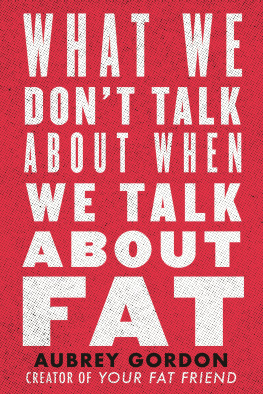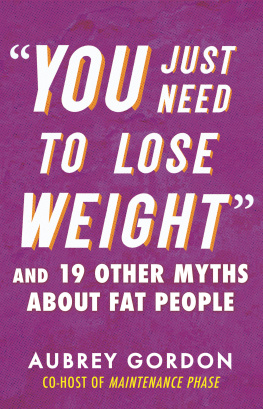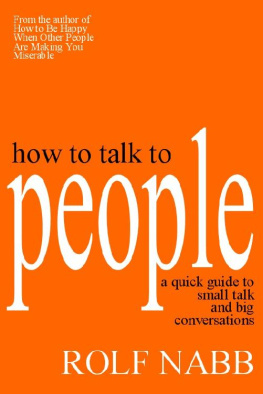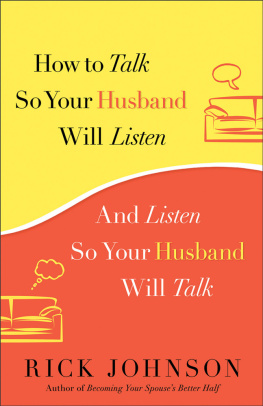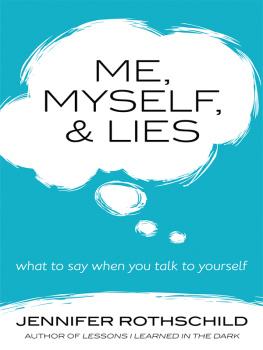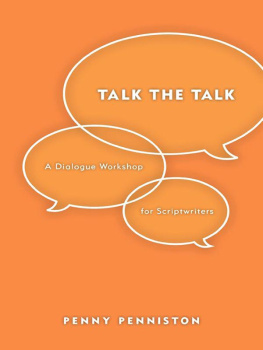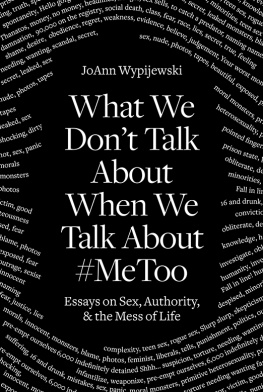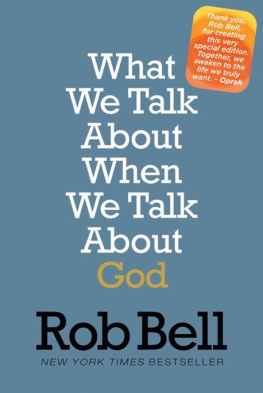Aubrey Gordon - What We Dont Talk About When We Talk About Fat
Here you can read online Aubrey Gordon - What We Dont Talk About When We Talk About Fat full text of the book (entire story) in english for free. Download pdf and epub, get meaning, cover and reviews about this ebook. year: 2020, publisher: Beacon Press, genre: Science. Description of the work, (preface) as well as reviews are available. Best literature library LitArk.com created for fans of good reading and offers a wide selection of genres:
Romance novel
Science fiction
Adventure
Detective
Science
History
Home and family
Prose
Art
Politics
Computer
Non-fiction
Religion
Business
Children
Humor
Choose a favorite category and find really read worthwhile books. Enjoy immersion in the world of imagination, feel the emotions of the characters or learn something new for yourself, make an fascinating discovery.
- Book:What We Dont Talk About When We Talk About Fat
- Author:
- Publisher:Beacon Press
- Genre:
- Year:2020
- Rating:5 / 5
- Favourites:Add to favourites
- Your mark:
- 100
- 1
- 2
- 3
- 4
- 5
What We Dont Talk About When We Talk About Fat: summary, description and annotation
We offer to read an annotation, description, summary or preface (depends on what the author of the book "What We Dont Talk About When We Talk About Fat" wrote himself). If you haven't found the necessary information about the book — write in the comments, we will try to find it.
What We Dont Talk About When We Talk About Fat — read online for free the complete book (whole text) full work
Below is the text of the book, divided by pages. System saving the place of the last page read, allows you to conveniently read the book "What We Dont Talk About When We Talk About Fat" online for free, without having to search again every time where you left off. Put a bookmark, and you can go to the page where you finished reading at any time.
Font size:
Interval:
Bookmark:


For Grandpa Gordon
I have always been fat.
Not chubby or fluffy or husky or curvyfat. As I write this, I weigh 342 pounds and wear a womens size 26. My body mass index (BMI) describes my body as super morbidly obese or extremely obese. Although my body is not the fattest in existence, it is the fattest the BMI can fathom. Three years ago, I weighed just over 400 pounds and wore a size 30 or 32, depending on the cut of the clothing. At my high school graduation, I wore a red wrap top in the highest size I could find at the timea womens 24.
For me, the size of my body is a simple fact. I do not struggle with self-esteem or negative body image. I do not lay awake at night, longing for a thinner body or some life that lies a hundred pounds out of reach. For me, my body isnt good or bad, it just is. But for the rest of the world, it seems, my body presents major problems.
Friends, family, strangers, and coworkers alike offer unsolicited diet advice and recommend bariatric surgeons. Other shoppers pick over my cart at the grocery store, freely removing items they dont think I should eat. Doctors refuse to treat me, and some offices set weight limits on the patients theyll seeweight limits that my body reliably exceeds. I pray that I do not need an MRI or a CAT scan, not because of the complex and frightening health troubles those tests may illuminate but because I likely will not fit into the equipments narrow tunnels and fixed walls. Strangers tell me, both online and in person, that my body is a death sentence and that every bite I take is a step toward a slow suicide. When I drive, disembodied shouts often echo from passing cars: GET OUT AND TRY WALKING FOR A CHANGE. These days, I mostly leave my windows rolled up.
Bodies like mine are seen by others as an open invitation to express disgust, fear, and insidious concern. They are seen as an invitation to laugh, a prop for hackneyed would-be comics to recite the same punchlines over and over again. They are fodder not just for cruel teenagers or overgrown adult bullies, but for everyone. Loved ones tut-tut when they see me reach for a second helping of anything, anxious that I may think myself deserving of as much food as them. The bulk of the anti-fat attitudes I have faced have come at the hands of thin people who deeply believed they were doing right and doing good, emboldened by a culture that wholeheartedly agreed with them.
In books, political cartoons, films, and TV shows, fat bodies make up the failings of America, capitalism, beauty standards, excess, and consumerism. Fat bodies represent at once the poorest of the poor and the pinnacle of unchecked power, consumption, and decay. Our bodies have borne the blame for so much. Whole artistic worlds are built on the premise that bodies like mine are monstrous, repulsive, andworst of allcontagious. From individuals to institutions, academia to the evening news, fat people are made bogeymen. And that spills into daily experiences of abuse, driven by intentions both good and ill, but always with the same outcome: an intense shame for simply daring to exist in the bodies many of us have always had.
There is a minefield of abuse reserved for the very fat. I have come to view the world through the prism of that abuse, negotiating my days around reducing it. Who will shout at me? Which doctors will refuse to see me? Which dates will mock my body? Which strangers will photograph me, make a meme of my skin? I avoid eye contact with strangers, knowing that our locking eyes are too often misconstrued as an invitation to shout or detail their judgments of my body. I deploy a charm offensive, calming agitated aggressors before they get the chance to unleash their fury. I have learned how to keep abusers at bay alone, knowing that no one else will intervene to support or defend me. I have developed this sad and necessary skill set because, in my soft and certain marrow, I know that the abuse faced by fat people is not understood to warrant a reckoning.
But the most difficult part of anti-fat attitudes isnt bullying, harassment, fear, or violence. I have come to expect epithets and aggression, have come to weather their heat and pressure. But I have never become accustomed to the complete lack of empathy from so many around me. As a white, queer woman, describing the challenges I may face from misogyny and homophobia may be difficult, but its increasingly met with some measure of sympathy. But when I disclose the abuse I have faced as a fat person, I am frequently met with a steely refusal to believe it. Did you do something to aggravate them? Maybe they thought they were helping. They were probably just concerned for your health. When anti-fatness turns institutional, as with staggeringly prevalent employment discrimination or punitive airline policies, others responses curdle, turning from indifference to outright defense. Suddenly, people who otherwise relish complaining about delayed flights and cramped legroom become airlines staunchest defenders.
People who dont wear plus sizes may struggle to hear the severity and irrationality of anti-fat abuse and bias. It may be difficult to believe, even unfathomable, that theres a world so different from their own. But anti-fat bias has always been there, as noxious and ubiquitous as polluted air. Still, thinner people arent forced to reckon with it. As ubiquitous as it may be, for many thinner people, anti-fatness doesnt present a barrier to healthcare, employment, transportation, or meeting other basic needs. Life in a thinner body means that the world is redacted, presented only in part.
The depth and breadth of anti-fatness can be difficult to believe, too, because anti-fat attitudes, comments, policies, and practices are ubiquitous. We cannot see the air weve been breathing for years, cannot touch the shifting ground beneath our feet. Anti-fatness has become invisible, a natural law. To many people who dont wear plus sizes, objecting to fat hate is as irrational as debating gravity. Why waste outrage on a simple fact of the world we live in? The thin Greek chorus in my life, when faced with the ubiquitous sharp edges of fat hate, have too readily insisted that you cant change the world, you can only change yourself, by which they have meant me.
For the most part, our woefully limited cultural conversation about fat people backs them up. Fatness is reliably demonized, discussed only in the context of how not to be fat (weight loss) or how fat will kill us immediately (the obesity epidemic). Fat experiences are only shared to contrast a more real story from a thin person or as a pitiable and wretched reality to conjure thin gratitude. Fat people are frequently spoken about or at, but were rarely heard. Instead, bodies and experiences like mine become caricatured and symbolic, either as a kind of effigy or as a pornography of suffering. Bodies and experiences like mine are rarely allowed to just be ours.
In recent years, a growing number of fat memoirs have joined the fold, but this book isnt that. It isnt a memoir of fat pain that will offer thin people comfort or relief that theyre not that fat. It isnt another entry in the canon of books about the perils of being fat or the frightening specter of the obesity epidemic. It isnt a weight loss book. You wont read about my longing for a thinner body or the lengths Ill go to in order to lose weight. This book will not reassure you that
Font size:
Interval:
Bookmark:
Similar books «What We Dont Talk About When We Talk About Fat»
Look at similar books to What We Dont Talk About When We Talk About Fat. We have selected literature similar in name and meaning in the hope of providing readers with more options to find new, interesting, not yet read works.
Discussion, reviews of the book What We Dont Talk About When We Talk About Fat and just readers' own opinions. Leave your comments, write what you think about the work, its meaning or the main characters. Specify what exactly you liked and what you didn't like, and why you think so.

